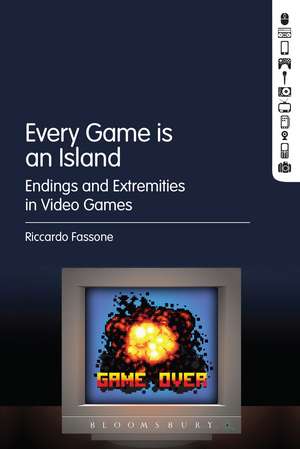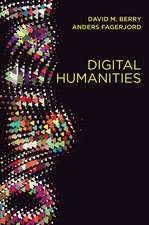Every Game is an Island: Endings and Extremities in Video Games
Autor Dr. Riccardo Fassoneen Limba Engleză Hardback – 22 feb 2017
| Toate formatele și edițiile | Preț | Express |
|---|---|---|
| Paperback (1) | 236.09 lei 6-8 săpt. | |
| Bloomsbury Publishing – 5 sep 2018 | 236.09 lei 6-8 săpt. | |
| Hardback (1) | 713.72 lei 6-8 săpt. | |
| Bloomsbury Publishing – 22 feb 2017 | 713.72 lei 6-8 săpt. |
Preț: 713.72 lei
Preț vechi: 1027.19 lei
-31% Nou
Puncte Express: 1071
Preț estimativ în valută:
136.61€ • 148.44$ • 114.83£
136.61€ • 148.44$ • 114.83£
Carte tipărită la comandă
Livrare economică 22 aprilie-06 mai
Preluare comenzi: 021 569.72.76
Specificații
ISBN-13: 9781501316616
ISBN-10: 1501316613
Pagini: 208
Dimensiuni: 152 x 229 x 20 mm
Greutate: 0.43 kg
Editura: Bloomsbury Publishing
Colecția Bloomsbury Academic
Locul publicării:New York, United States
ISBN-10: 1501316613
Pagini: 208
Dimensiuni: 152 x 229 x 20 mm
Greutate: 0.43 kg
Editura: Bloomsbury Publishing
Colecția Bloomsbury Academic
Locul publicării:New York, United States
Caracteristici
Develops a novel theory of video games, conceived as designed procedural experiences in which constraints and limitations - aesthetic, technological, economic, etc. - are just as valuable as choices and affordances both for the designer and the player
Notă biografică
Riccardo Fassone is a post-doctoral research fellow at the University of Torino, Italy, where he works on the history of the Italian video game industry. He is among the founders of GAME. The Italian Journal of Game Studies has published several articles and book chapters on the history and theory of video games, and their intersections with other media. He has a background in film and media studies and has worked as visiting researcher at the Georgia Institute of Technology and as research fellow at The Strong National Museum of Play in Rochester, NY.
Cuprins
ACKNOWLEDGEMENTS LIST OF ILLUSTRATIONSINTRODUCTIONA BOOK ABOUT EXTREMITIESRyu's closureEvery game is an island and no game is an islandAgainst currentness STRUCTURE OF THE BOOKThree levels and some wordplay 1. TWO NON-DEFINITIVE DEFINITIONSWHAT IS A VIDEO GAME?Doing away with definitionsVideo games change through timeWhat I mean by "video game"THE EXCEPTIONALITY OF VIDEO GAMESDigital exceptionalismThe inflexible code Authoritative video games COMPUTER-MEDIATED GAMESInteraction? State machines and cybertexts The cybernetic playerDESIGNED PROCEDURAL EXPERIENCESThe project of experienceDesignProceduresExperience2. GAME <> GAME CLOSURE The finite model of an infinite universeAn archaeology of digital closure Finishing the gameClosure in Super MetroidCAESURAContinue? Prescribed endingThe death and rebirth of game over Game over and over: A rhetoric of repetition Bodily pleasures: Game over as spectacular device in Dead Space 2 ENDLESSNESSPlaying indefinitelyA compact history of infinite games From arcade to casual The utopic castle: Battlezone OPENNESS Video games as toys Expressive players and simulation savvies Super Scribblenauts The winged guitarist 3. GAME <> METAGAME FRAGMENTATIONOverlooked and underrated Player-operated breaks: PAUSE Machine-operated breaks: LOADINGIs this life reality? Eternal Darkness: Sanity's RequiemMETAGAMINGPlaying outside the game The legacy of dice Knights of Pen and Paper: role-playing revisited IMMERSION The utopia of total immersionImmersive fallacies Immersion, metacommunication, incorporation Through the eyes of Riddick: Escape from Butcher Bay HOLISM Flow: a scholarly tradition Designing for flow? Total interface: Uplink 4. GAME <> GAMES UNIQUENESS In search of the golden cartridgeCuriosity and A Slow Year Distancing strategiesA game I will never play Chain WorldEPHEMERALITYReconsidering OSGONS Catharsis and procedures Review your choices: One Single Life MODULARITY Opera aperta 2.0 Mods and modules: Game engines as branch systemsThe flex of the wrist: Garry's Mod SERIALIZATION Playing nostalgia Xbox Live Arcade: series and/as archivesSub-series, meta-gamesOld new games: Final Fight Double Impact 5. CONCLUSIONS FROM THE OUTSIDE INMom's heart Games are about endingMoving forward BIBLIOGRAPHY LUDOGRAPHY FILMOGRAPHY
Recenzii
.Every Game is an Island is an important work in formalist game studies, one which serves to situate the video game object in relation to wider discourses of textuality and the media object.
While Riccardo Fassone is talking about limitations, endings and closures, he is doing it with an amazing open mind. He is in fact pushing boundaries, pointing us new areas to consider, encouraging us to pay attention to details and, above all, showing us how far game studies have come since we have started to explore videoludic islands. If I can extend the metaphor, I'll say that Fassone is a great voyager.
In Every Game Is an Island Riccardo Fassone provides us with a fascinating look at what games look like and how they can be understood, when approached from their ends and boundaries. Are games finite and clearly defined objects to start with, or are games' procedural and performance related dimensions pre-empting all attempts to capture them in their entirety? How is the aesthetic value of games related to their ephemerality? This study makes use of dazzling array of scholarship from multiple fields, ranging from computer science to continental philosophy, building bridges between disciplines, thereby also lessening the chance of intellectual endeavours related to games remaining as islands, isolated from each other. This is one of the best works that fully recognises the enormous diversity and complexity of game form, written so far.
In a medium obsessed with openness and possibility, Fassone shows why boundaries and limitations offer a better measure for games.
Every Game is an Island is a provocative and necessary book for game studies. In this book, Riccardo Fassone proposes an irreverent, well-read, and productive approach to many of the key topics in game studies, from immersion to nostalgia. Every Game is an Island delivers comprehensive readings and re-rereadings of games and game scholarship, encouraging us to think extremely about the extremes of games.
While Riccardo Fassone is talking about limitations, endings and closures, he is doing it with an amazing open mind. He is in fact pushing boundaries, pointing us new areas to consider, encouraging us to pay attention to details and, above all, showing us how far game studies have come since we have started to explore videoludic islands. If I can extend the metaphor, I'll say that Fassone is a great voyager.
In Every Game Is an Island Riccardo Fassone provides us with a fascinating look at what games look like and how they can be understood, when approached from their ends and boundaries. Are games finite and clearly defined objects to start with, or are games' procedural and performance related dimensions pre-empting all attempts to capture them in their entirety? How is the aesthetic value of games related to their ephemerality? This study makes use of dazzling array of scholarship from multiple fields, ranging from computer science to continental philosophy, building bridges between disciplines, thereby also lessening the chance of intellectual endeavours related to games remaining as islands, isolated from each other. This is one of the best works that fully recognises the enormous diversity and complexity of game form, written so far.
In a medium obsessed with openness and possibility, Fassone shows why boundaries and limitations offer a better measure for games.
Every Game is an Island is a provocative and necessary book for game studies. In this book, Riccardo Fassone proposes an irreverent, well-read, and productive approach to many of the key topics in game studies, from immersion to nostalgia. Every Game is an Island delivers comprehensive readings and re-rereadings of games and game scholarship, encouraging us to think extremely about the extremes of games.












